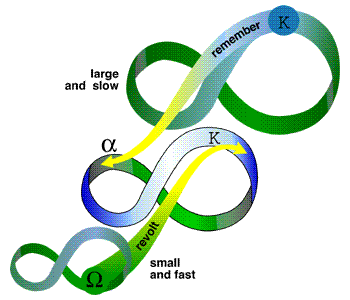An important quote from the father of resilience science – Buzz Holling (via Computing For Sustainability “Visualizing Sustainability“)
Thomas Homer Dixon: “Why do you feel the world is verging on some kind of systemic crisis?”
Buzz Holling: “There are three reasons,” he answered. “First, over the years my understanding of the adaptive cycle has improved, and I’ve also come to better understand how multiple adaptive cycles can be nested together-from small to large-to create a panarchy. I now believe that this theory tells us something quite general about the way complex systems, not just ecological systems, change over time. And collapse is usually part of the story.
“Second, I think rapidly rising connectivity within global systems-both economic and technological-increases the risk of deep collapse. That’s a collapse that cascades across adaptive cycles-a kind of pancaking implosion of the entire system as higher-level adaptive cycles collapse, which causes progressive collapse at lower levels.”
“A bit like the implosion of the World Trade Center towers,” I offered, “where the weight of the upper floors smashed through the lower floors like a pile driver.”
“Yes, but in a highly connected panarchy, the collapse doesn’t have to start at the top. It can be triggered at the microlevel or the macrolevel or somewhere in between. It’s the tight interlinking of the adaptive cycles across the whole system-from the individual right up to the level of the global economy and even Earth’s biosphere-that’s particularly dangerous because it increases the likelihood that many of the cycles will become synchronized and peak together. And if this happens, they’ll reinforce each other’s collapse.”
… (via WorldWatch
The first response of many people hearing something like this is probably “that’s ridiculous chicken little propaganda.” The idea that our meteoric growth & progress is subject to limits, and very likely “collapse,” is despicable to the mind of modern man. After all, the Enlightenment was explicitly about the progress of humanity through the application of reason. So, those who remind us that our success is about more than just our own human faculties, and is in fact, intimately connected to the natural world are often marginalized. The famous Erhlich-Simon bet, the vilification of the Club of Rome and their Limits to Growth work, and other such examples make clear that those who dare to question the dogma of neoclassical economics are often met with notable resistance.
But just because the so-called “techno-resource-market optimists” can claim isolated victories (in a world of continuously rising energy availability), doesn’t mean that the debate is over. To the contrary, I think the debate is just about to get interesting. As global oil production peaks, I think many of the past victories of the Pollyanna’s will be put into a more comprehensive picture which shows that they were only right in a very limited sense.
The way I see it, ecological thinking will be one of the most valuable perspectives to have in one’s mental repertoire in the 21st Century. People like Buzz Holling, Herman Daly, Bill Rees and others are the people whose ideas will have a major impact on the world for the remainder of this turbulent century. As the 19th Century French writer Victor Hugo once said “there is nothing more powerful than an idea whose time has come.” If it’s true, as I believe it is, that Peak Oil will drive a fundamental change in how global systems operate, then I think it’s fair to say that understanding & being able to apply ecological principles will be a major asset. Only those with a comprehensive understanding of the complexity of nature and the way it’s systems operate, will have a chance of really grasping what’s going on.
I for one plan to dig more deeply into the work of these thinkers. I’ll share more as I learn.
Cheers,
-a.j.m.
